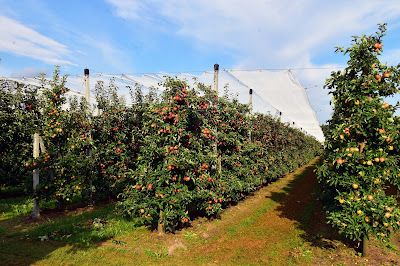My walk took me through Machcin II; as I passed a small forest, mainly pines, I noted smell familiar from childhood - mushrooms. We used to pick mushrooms in Oxshott Common - but since leaving the parental home, I've not done it again. And (puzzlingly) never during my 24 years in Poland, where mushroom picking is a big thing. My parents taught me the mushroom-picking lore - the importance of podłoże - the terroir - sandy soil, pine trees, moss, dips in the forest floor, lift the whole mushroom out of the earth rather than cutting the stalk with a knife. We'd go armed with a wicker basket, which most Sunday mornings would contain 20 to 30 nice specimens. On return, the mushrooms would be dried or marinaded in jars of vinegar with onions and carrots.
The smell brought it all back. I decide in an instant to turn off the path and go into the wood - just then I see a few metres away an old woman emerging from the trees, holding in her hand a large plastic shopping bag full of mushrooms. Six or seven kilos, I'd guess. Had she scoured the forest floor clean of all edible species? For the first time in decades, I take a determined look for Boletus edulis - prawdzwiki, porcini - in my books, the finest of all mushrooms, with a velvety brown cap and a creamy-yellow spongy underside. I spend about ten minutes and find nothing but various species of poisonous fungi, death caps (Amanita phalloides) and toadstools. Eating one is often lethal; death from liver and kidney failure ensues after six to 16 days. Nasty.
Clearly, the old woman has done a thorough job. I try another patch of forest a few hundred metres away. Again, ten minutes, head bowed, close to the forest floor. Again, plenty of fungi, none of them edible. Poisonous mushrooms make no attempt to hide themselves, the boletus is not easy to find. But then - bingo! That's a maślak żółty if memory serves me... (below, back on the działka). I put the pic up on Twitter and within minutes have my identification confirmed by Daria, Bożena and Janusz (many thanks!). I am drying these for future consumption. Incidentally, while Polish Wikipedia (link above) says that the maślak żółty (Suillus grevillei) "is tasty and has the texture of meat, English Wikipedia says that S. grevillei "is an edible mushroom (without consistency nor flavor) if the slimy cuticle is removed off the cap, which can cause intestinal issues".
Below: can you smell that smell? Very characteristic of late summer/early autumn, especially after rain.
Gold Train rush: the search intensifies
The Vistula from on high
This time 10 years ago:
Bad car day
This time 11 years ago:
Dragonfly summer
This time 12 years ago:
"What do we want?" "Early retirement!"
This time 14 years ago:
Greenhouse sunset






















































